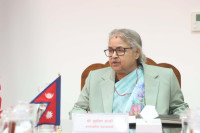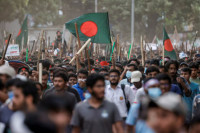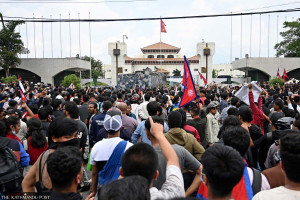Opinion
Power plays
Inability of the Congress and UML to adopt a democratic decision-making process alienated the Madhesis
The past week has been tumultuous. While one part of the country celebrated the promulgation of the constitution, the other part remains in turmoil. Add to that the spiralling anti-Indian fervour, stoked in part by India’s refusal to welcome the constitution. A constitution that was drafted by almost 90 percent of the Constituent Assembly (CA) and was elected by 80 percent of the voters. After all, how long can we wait for a new statute; it took us almost eight years anyway.
There are other strong arguments made in support of the constitution too. Such as, why should we listen to foreign powers when we are a sovereign country? There are so many social groups in our country that it is impossible to fulfil everyone’s wishes. And then, we can always ‘correct’ the shortcomings in the future.
There can be no counter argument to spar with the above logic. Only context, and maybe a greater understanding of the invisible ways in which power works and creates inequalities, including the ways in which it shapes various processes and outcomes will help make things clearer.
Unequal power relations
The first context is a jarring one. Why are the Madhesi people unwilling to own the constitution and celebrate this great moment? Why has a rigid boundary been created between the ‘Madhesis’ and the ‘Nepalis’? Is it just a subjective disposition arising out of ‘ignorance’ about the constitutional provisions, as many would like to argue, or is there an objective ground for such grievances?
The fact that the whole of the Madhes is contesting the constitution makes it impossible for us to wish it away without dealing with the underlying causes and mechanisms.
The second context is that of power and legitimacy of the constitution. The CA elections and the ensuing ‘process’ have given visible legitimacy to the process.
The resistance of the Madhesis and some other groups to the ‘legitimacy’ of the constitution is worrying. While this disagreement appears to be about the content of the statute, it does not explain everything. This is more about discontent towards the decision-making process, which was reflected in the unequal power relations between various identity groups that prevented the Madhesis and Janajatis from taking part in the process in a dignified manner.
The second dimension of power is largely invisible. Those in power can shape the outcomes by preventing certain agendas from entering the process and by excluding the forces that have the potential to generate unwanted results.
And the international community is partly to be blamed for this. The international community is more interested in enforcing transparency in the decision-making process when it does not trust the dominant stakeholders engaged in the constitution-drafting process. During the second CA, however, the international community assumed that the two parties in power were sufficiently democratic. They failed to consider the fact that these two parties represented the power elites in our society who are responsible for sustaining social inequalities.
As a result, most of the earlier social and political contracts about the process were overturned, the Supreme Court’s ruling was ignored, and the public was granted less than a week to discuss the draft of the new constitution.
While the Maoists led by Prachanda capitulated, because they had their own self interests to protect, the Madhesi and Janajati forces were left out. Now all those loktantravadis are going to attack me for daring to make this argument. But we need to look deeper into the causal mechanisms that can explain both individual and collective dispositions.
As Charles Tilly has demonstrated with so many of his brilliant explorations in social history, we must face the fact that social inequality is a special form of collective identity. The unequal power relation, which exists in our society, managed to manifest itself during the constitution-drafting process because of the inadequacies of our decision-making process.
Indian position
The third context is that of our nationalism vis-a-vis India.
Even as Nepal has been divided into two distinct groups, the role of India has diverted the attention away from the core issues of the constitution, and has allowed both the left and the right to play the anti-India card to sideline internal dissent on the constitution-drafting process as well as on the content of the constitution.
Everything that was wrong with our hill-centric nationalism is now making a comeback. Such nationalism is worrying from at least three perspectives. First, it excludes the Madhesis and minorities. Second, it strengthens the base of the power elites and weakens people’s access to political and economic institutions, the public sphere and systems of sovereignty. Third, it is diverting attention away from the content of the constitution and the possibility of democratisation and economic growth.
Why has India refused to give legitimacy to Nepal’s constitution? What does India have to gain? The most obvious factor is India’s unwillingness to abandon the Madhesi cause, because India’s security requires good neighbourly relations with the bordering communities. This includes sanitisation of the border region from radical communist ideology. Currently, it looks as though India is willing to alienate the people of hill origin who otherwise could have better served its other strategic interests like water security and
balancing China.
When the Indian Prime Minister Narendra Modi visited Nepal, he was able to mellow Prachanda, with many believing that the two leaders had developed a new level of understanding. Prachanda’s turnaround, in recent days is, therefore, an indication that their relationship has been superseded by some other concerns.
Way forward
Political parties have always remained the key reason behind the failure of Nepal’s politics. The new constitution strengthens the role of a handful of political leaders, allows excessive centralisation of decision-making, and sustains undemocratic power relations between the leaders and the people they represent.
Those in power will now invest a lot of resources gained from exploitation and extraction, to maintain boundaries that create inequality. As a result, we cannot really change the ‘shortcomings’ that fail to make political leaders and political parties accountable and transparent.
The first step forward would be to address the questions of power inequalities and legitimacy. Now that the constitution has already been drafted, the Madhesi populace can never feel ownership of this document because they were sidelined from the process. But the failures in the process can at least be acknowledged publicly and egalitarian relations restored by symbolic actions, which can include a broader consultative meeting with the Madhesi forces leading to some changes in the constitution.
Such symbolic actions have to be supported by a sincere realisation of the real problem, that this alienation of the Madhesis was a result of the inability of the Nepali Congress and CPN-UML to adopt a sufficiently democratic decision-making process. This assertion, again, is likely to be contested heavily.
However, if we are incapable of looking at ourselves in a dispassionate manner, we will not be able to dissolve the categorical boundaries that we have created. Nor can we rise above the collective identities that are being generated by unequal power relations.




 16.29°C Kathmandu
16.29°C Kathmandu











